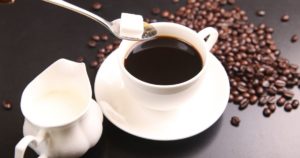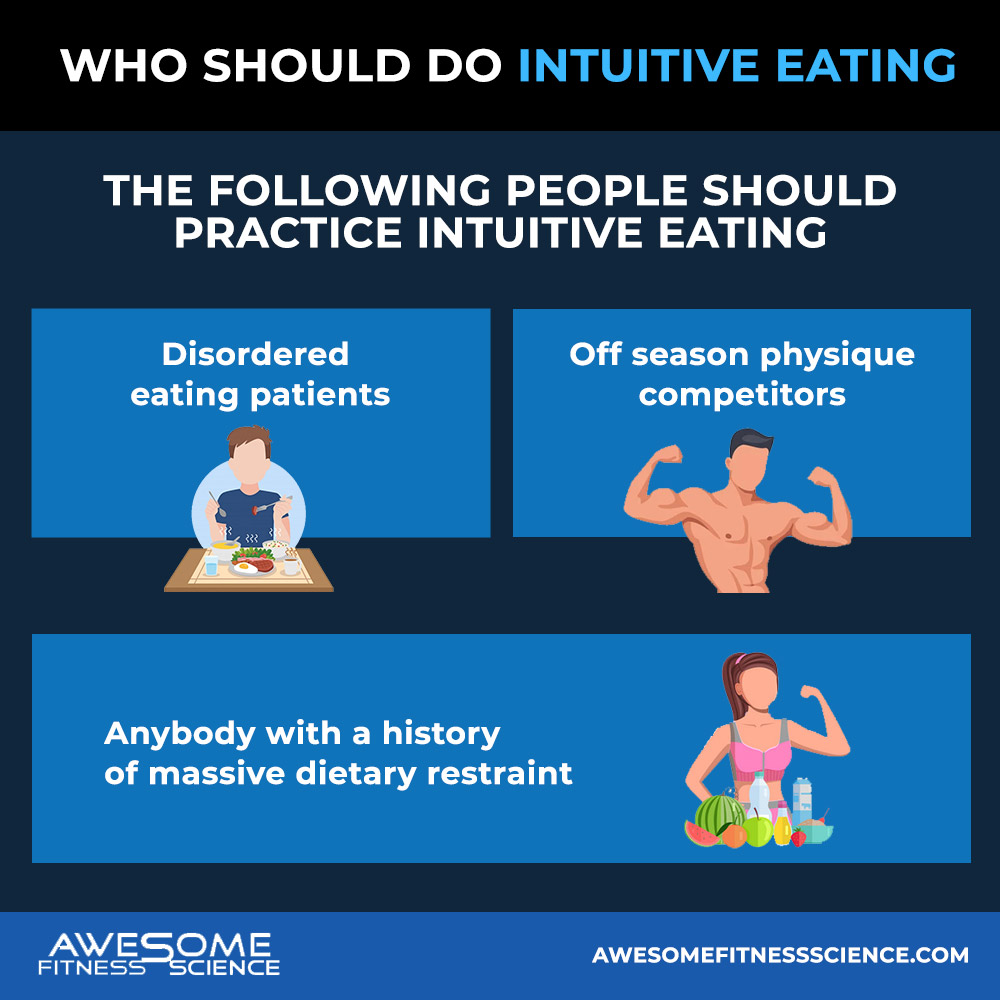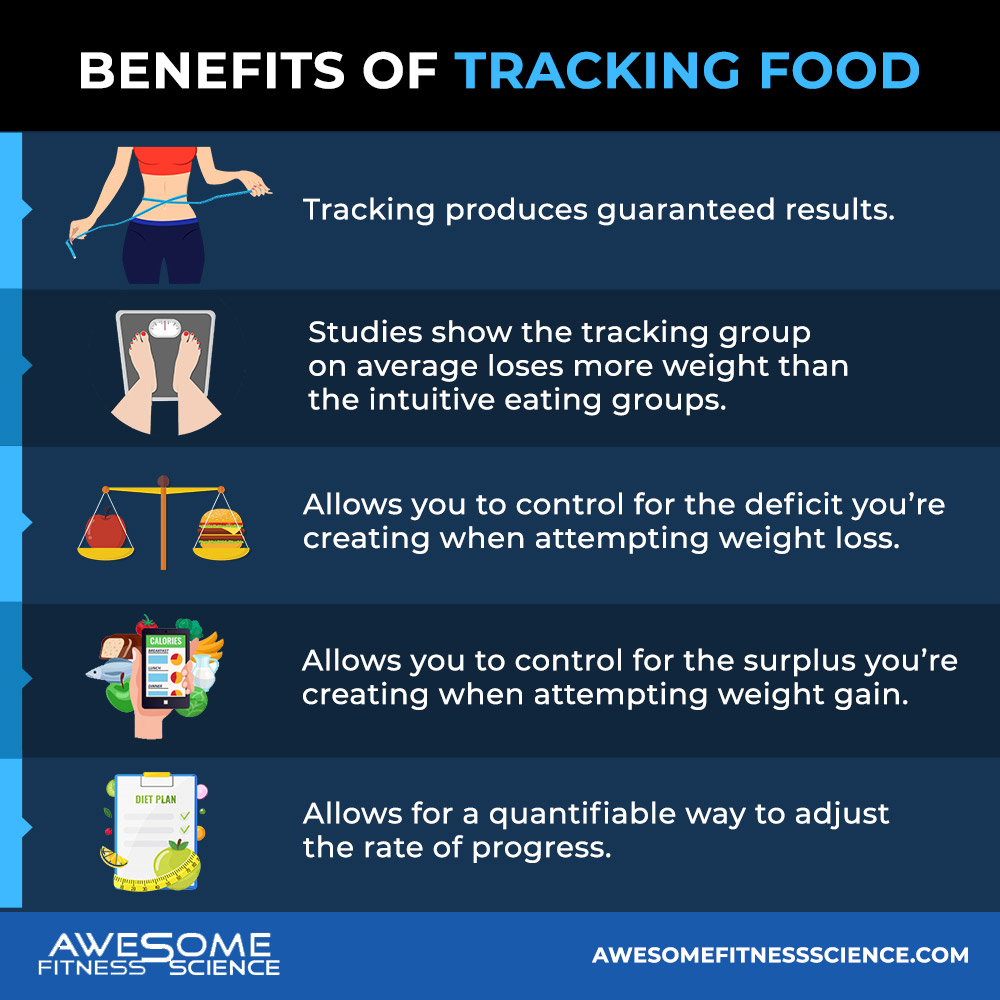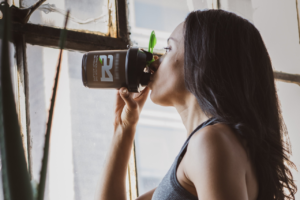
The Truth About Coffee and Caffeine
You probably don’t know the crucial facts about coffee like how it works, what it does, how much to drink, and the myths surrounding it. Allow me to enlighten you my friend.

Intuitive eating is an eating style or eating philosophy where you eat in tune with your body’s hunger signals. This is similar to ad libitum eating which is defined as eating till desired. In this article, I’ll be discussing the pros and cons of intuitive eating and who it’s right for.
I will not discuss how to implement and practice intuitive eating here. That will be for another article (part 2).
But anyways, intuitive eating is often viewed as the opposite of IIFYM (if it fits your macros) where you’re tracking calories/macros. However, this isn’t accurate. Allow me to explain using my philosophical Chinese roots.
Enter the Yin Yang Concept. I know this sounds a bit mythical, but trust me. It is critical to understanding nutrition. And for my more pragmatic readers, I promise to use science later too.
The ancient Chinese philosophy of yin and yang is essentially the concept of dualism. Two opposing forces coexisting, but are also complimentary of each other.
In fact, true understanding of yin and yang accepts that the 2 forces not only oppose and complement each other, but are also interconnected and depend on each other. That’s the same relationship between intuitive eating and tracking macros.
So while they have clear differences, they have more similarities that complement each other than most people think.
Both practices are essentially tour guides to the same end of goal which is behavior change. You have some sort of goal whether it’s weight loss, weight maintenance, or even weight gain. Developing a better relationship with food and improving your health might also be weaved into your goal.
But whatever your set of goals are, you must have some sort of needed behavior change to achieve those goals. Based on your starting point, your particular goal, and desired speed of progress, one tour guide may be more suitable to lead you there.
So let’s go over their respective pros and cons.
For starters, intuitive eating is the more natural way of eating. This is how your ancestors ate before tracking apps were a thing. Intuitive eating is also more sustainable because it’s easier to learn, thus has higher adherence rates.
Now, something being more natural and sustainable doesn’t make it more practical and flexible. This is a common misconception that I’ll elaborate on later, but first, let me gas up intuitive eating some more because it has some more noteworthy benefits.
The psychological transition to intuitive eating is less daunting than telling somebody to track numbers (5). It’s also associated with less mental stress, less disordered eating, higher emotional well-being, higher body positivity, and reduced hunger (1-7).
For these reasons, disordered eating patients, off season physique competitors, or really anybody with a history of massive dietary restraint should practice intuitive eating (8,9).

However, intuitive eating is not the same thing as flexible dietary control which is the ability to be flexible with your eating (10). Flexible dietary control comes down to your mindset. You should think flexibly whether you’re eating intuitively or tracking macros.
As for tracking macros it isn’t as strongly associated with the same levels of emotional and mental well-being, but this is a matter of perception.
People often associate tracking with, “Oh my gosh, it’s going to be so complicated, take 10 hours per day to weigh food, and if I don’t track something, I’m screwed.” So It’s no surprise people have more mental gripe with tracking in some research.
However, when people actually give it a shot even without professional help, apps are easy to use and promote self-efficacy (11). When you add in professional help to explain how tracking is not the goal itself, but rather a guide to change your behavior, people are happier to track (12).
In fact, subjects achieved lasting weight loss while objectively improving their emotional well-being and reducing distress (12). This is even in spite of being assigned very low-calorie diets. Lastly, tracking macros is mentally fine as long as the person has no history of eating disorders or related risks (30).
So while intuitive eating may have emotional/mental benefits at face value, this is likely due to the simplistic nature of intuitive eating paired with the perceived bad reputation of tracking.
However, emotional stuff aside, tracking has some clear advantages due to it’s inherent precision.
Assuming you stick with it (and do it correctly), tracking produces guaranteed results and faster fat loss. Indeed, research finds people sticking to macros lose fat faster than people who don’t (2,4,12).
Even in a study where consistency was poor on both sides and there was no statistical difference, the tracking group lost weight while the intuitive eating group gained weight (13).
Tracking directly allows you to control for the deficit you’re creating when attempting weight loss. It ensures you results if set it up correctly (and obviously adhered to). Tracking also allows for a quantifiable way to adjust the rate of weight loss if need be (14).
The precision of tracking even out performs directly changing behavior alone resulting in faster fat loss (15).

In many studies, intuitive eating improves your attunement to hunger which is quite clear for anyone who’s practiced it. You become more mindful with your hunger and fullness signals allowing you stop eating sooner.
With tracking macros, you build awareness of the caloric composition within food and their respective portions. For example, if you track a serving a peanut butter, you’ll realize how caloric it is for such a small amount. You’re suddenly much more particular about what’s worth entering your mouth.
Both, hunger attunement and food composition are valuable lessons to learn, but they allow for different levels of flexibility due to their nature.
With intuitive eating, you have the flexibility to simply eat. You don’t have to worry about weighing, measuring, or estimating macros when eating out. However, this comes with drawbacks because you’re at the mercy of your hunger/fullness signals which detects satiety not caloric consumption.
So it’s quite easy for people to intuitively eat past their intended calorie especially if weight loss is the goal. In fact, many people who practice it have no difference in their caloric intake (16). This is why intuitive eating is often associated with weight maintenance but not weight loss (17).
Even this can be an overly optimistic conclusion because intuitive eating research has huge confounders. Even though participants are often allowed to eat whatever the lab provides, people will choose lower calorie healthier options when they’re available while researchers are looking at them. In other words, we act better when people are watching.
The average person’s pantry is filled with Reese’s peanut butter cups and potato chips and left to their own will, people are often choosing high calorie foods.
So even if you attain hunger awareness skills from intuitive eating, overly processed foods aren’t designed to respect your fullness signals.
They seduce your brain’s reward system making you want more while overflowing with calories (18-21). Furthermore, obese individuals have dysregulated food reward systems and fullness signals in the brain (22,23,24).
So telling a weight loss struggler to simply follow their fullness signals and eat till their satisfied can easily be pointless advice.
Furthermore, most people can’t adjust their intake to offset overconsumption. When humans are left to their own instincts, we simply suck at appropriately eating less at one meal when we’ve overeaten at another (25). So, to increase the chances of intuitive eating producing consistent weight loss, you have to stick to more satiating whole foods.
While some people promote intuitive eating as a free pass to eat whatever you want, that’s only the case if you have no body composition goals.
Grab my free checklist on how to defeat your worst food cravings
With tracking macros, you know exactly how many calories you can spend for the day. You can eat less during one meal to allow for more flexibility in another. You can manage your calories however you like while still making body composition progress. This comes from learning about the caloric content in food.
Indeed, studies find tracking macros improve food awareness and education (26,27). In fact, we even have research showing that when learning the caloric information in food, it reduces the brain’s reward system and desire for certain caloric foods while increasing self-control for them (28).
So while it’s grim to realize a serving of your favorite foods contain enough calories to feed a third world country, those moments physiologically improve how you select food moving forward. The drawback with tracking as I mentioned earlier is having to track which takes a bit more time to learn and practice. Your first week of macro tracking may require a couple hours to master. Fortunately, it should only take about 5-15 minutes per day once mastered.
Moreover, you only have to track macros diligently for one period (ideally for 4 months) in your life to absorb the food awareness benefits. Sure, you may already know what foods are caloric and which foods aren’t. It doesn’t take a genius to know that lean protein, fruits, veggies, and most whole foods are worth prioritizing while overly processed foods are best limiting.
You already knew this, but experiencing it for yourself with exact numbers is what triggers lasting behavior change.
Anyways, you can see the pros and cons with both approaches below.
Tracking macros is more results based, but your results won’t be sustainable without learning how to intuitively eat.
Intuitive eating is more lifestyle based, but you need the food awareness from tracking to produce results effectively.
The more aggressive and the more married you are to your results, the more likely you should track macros. The more you care about long term lifestyle and aren’t married to specific goals, the more likely you should practice intuitive eating.
This can change throughout the course of your life. For example, I don’t track most of the year, but if I want to get precise or have serious goals, I’ll start tracking.
Regardless, the goal of both paths is to change your behavior. The skills and knowledge you gain from either path means nothing if your habits don’t change (29).
You can build up your food awareness with tracking macros, but if you still binge on a box of Oreos each day without tracking it, you’ll continue being an overweight blob.
Same with intuitive eating. You have to put in the time/effort to learn your satiety signals while actually following through and consistently putting down your fork early enough.
1. Schaefer, Julie T., and Amy B. Magnuson. “A Review of Interventions That Promote Eating by Internal Cues.” Journal of the Academy of Nutrition and Dietetics, Elsevier, 14 Mar. 2014, www.sciencedirect.com/science/article/abs/pii/S2212267213018960.
2. M;, Lim. “Psychological Effects of Prescriptive vs General Lifestyle Advice for Weight Loss in Young Women.” Journal of the American Dietetic Association, U.S. National Library of Medicine, pubmed.ncbi.nlm.nih.gov/19857635/.
3. Bacon. “Size Acceptance and Intuitive Eating Improve Health for Obese, Female Chronic Dieters.” Journal of the American Dietetic Association, U.S. National Library of Medicine, pubmed.ncbi.nlm.nih.gov/15942543/.
4. Bacon . “Evaluating a ‘Non-Diet’ Wellness Intervention for Improvement of Metabolic Fitness, Psychological Well-Being and Eating and Activity Behaviors.” International Journal of Obesity and Related Metabolic Disorders : Journal of the International Association for the Study of Obesity, U.S. National Library of Medicine, pubmed.ncbi.nlm.nih.gov/12037657/.
5. Bruce, Lauren J., and Lina A. Ricciardelli. “A Systematic Review of the Psychosocial Correlates of Intuitive Eating among Adult Women.” Appetite, Academic Press, 22 Oct. 2015, www.sciencedirect.com/science/article/abs/pii/S0195666315300635.
6. T;, Cole. “Effectiveness of the ‘My Body Knows When’ Intuitive-Eating Pilot Program.” American Journal of Health Behavior, U.S. National Library of Medicine, pubmed.ncbi.nlm.nih.gov/20001186/.
7. Leblanc . “Impact of a Health-At-Every-Size Intervention on Changes in Dietary Intakes and Eating Patterns in Premenopausal Overweight Women: Results of a Randomized Trial.” Clinical Nutrition (Edinburgh, Scotland), U.S. National Library of Medicine, pubmed.ncbi.nlm.nih.gov/22296874/.
8. Richards. “Can Patients with Eating Disorders Learn to Eat Intuitively? A 2-Year Pilot Study.” Eating Disorders, U.S. National Library of Medicine, pubmed.ncbi.nlm.nih.gov/28151055/.
9. Helms, Eric R., et al. “Towards a Sustainable Nutrition Paradigm in Physique Sport: A Narrative Review.” MDPI, Multidisciplinary Digital Publishing Institute, 16 July 2019, www.mdpi.com/2075-4663/7/7/172.
10. Tylka, Tracy L., et al. “Is Intuitive Eating the Same as Flexible Dietary Control? Their Links to Each Other and Well-Being Could Provide an Answer.” Appetite, Academic Press, 8 July 2015, www.sciencedirect.com/science/article/abs/pii/S0195666315003219#bib61.
11. Ferrara, Giannina, et al. “A Focused Review of Smartphone Diet-Tracking Apps: Usability, Functionality, Coherence With Behavior Change Theory, and Comparative Validity of Nutrient Intake and Energy Estimates.” JMIR MHealth and UHealth, JMIR Publications, 17 May 2019, www.ncbi.nlm.nih.gov/pmc/articles/PMC6543803/.
12. Rapoport, L, et al. “Evaluation of a Modified Cognitive–Behavioural Programme for Weight Management.” Nature News, Nature Publishing Group, 4 Dec. 2000, www.nature.com/articles/0801465.
13. Laing, Brian Yoshio, et al. “Effectiveness of a Smartphone Application for Weight Loss Compared with Usual Care in Overweight Primary Care Patients: a Randomized, Controlled Trial.” Annals of Internal Medicine, U.S. National Library of Medicine, 18 Nov. 2014, www.ncbi.nlm.nih.gov/pmc/articles/PMC4422872/.
14. Ingels, John Spencer, et al. “The Effect of Adherence to Dietary Tracking on Weight Loss: Using HLM to Model Weight Loss over Time.” Journal of Diabetes Research, Hindawi, 2017, www.ncbi.nlm.nih.gov/pmc/articles/PMC5568610/.
15. Turner-McGrievy, Gabrielle M, et al. “The Dietary Intervention to Enhance Tracking with Mobile Devices (DIET Mobile) Study: A 6-Month Randomized Weight Loss Trial.” Obesity (Silver Spring, Md.), U.S. National Library of Medicine, Aug. 2017, www.ncbi.nlm.nih.gov/pmc/articles/PMC5529231/.
16. HA;, Grider. “The Influence of Mindful Eating and/or Intuitive Eating Approaches on Dietary Intake: A Systematic Review.” Journal of the Academy of Nutrition and Dietetics, U.S. National Library of Medicine, pubmed.ncbi.nlm.nih.gov/33279464/.
17. EJ;, Van. “Relationships between Intuitive Eating and Health Indicators: Literature Review.” Public Health Nutrition, U.S. National Library of Medicine, pubmed.ncbi.nlm.nih.gov/23962472/.
18. de Macedo. “The Influence of Palatable Diets in Reward System Activation: A Mini Review.” Advances in Pharmacological Sciences, U.S. National Library of Medicine, pubmed.ncbi.nlm.nih.gov/27087806/.
19. Fazzino, Tera L., et al. “Hyper‐Palatable Foods: Development of a Quantitative Definition and Application to the US Food System Database.” Wiley Online Library, John Wiley & Sons, Ltd, 5 Nov. 2019, onlinelibrary.wiley.com/doi/full/10.1002/oby.22639.
20. White . “Development and Validation of the Food-Craving Inventory.” Obesity Research, U.S. National Library of Medicine, pubmed.ncbi.nlm.nih.gov/11836456/.
21. Schulte, Erica M., et al. “Which Foods May Be Addictive? The Roles of Processing, Fat Content, and Glycemic Load.” PLOS ONE, Public Library of Science, journals.plos.org/plosone/article?id=10.1371%2Fjournal.pone.0117959.
22. JL;, Temple. “Behavioral Sensitization of the Reinforcing Value of Food: What Food and Drugs Have in Common.” Preventive Medicine, U.S. National Library of Medicine, pubmed.ncbi.nlm.nih.gov/27346758/.
23. Hopkins, Mark, and John E. Blundell. “Energy Balance, Body Composition, Sedentariness and Appetite Regulation: Pathways to Obesity.” Portland Press, Portland Press, 8 Aug. 2016, portlandpress.com/clinsci/article-abstract/130/18/1615/71471/Energy-balance-body-composition-sedentariness-and?redirectedFrom=fulltext.
24. Grannell, Andrew, et al. “Fat Free Mass Is Positively Associated with Hunger and Energy Intake at Extremes of Obesity.” Appetite, Academic Press, 5 Sept. 2019, www.sciencedirect.com/science/article/abs/pii/S0195666319305860.
25. Apolzan, John W, et al. “Short-Term Overeating Results in Incomplete Energy Intake Compensation Regardless of Energy Density or Macronutrient Composition.” Obesity (Silver Spring, Md.), U.S. National Library of Medicine, Jan. 2014, www.ncbi.nlm.nih.gov/pmc/articles/PMC3873377/.
26. Paromita Banerjee, Vishnu Vardhana Rao Mendu. “Calorie Counting Smart Phone Apps: Effectiveness in Nutritional Awareness, Lifestyle Modification and Weight Management among Young Indian Adults – Paromita Banerjee, Vishnu Vardhana Rao Mendu, Damayanthi Korrapati, SubbaRao M Gavaravarapu, 2020.” SAGE Journals, journals.sagepub.com/doi/10.1177/1460458219852531?url_ver=Z39.88-2003&rfr_id=ori%3Arid%3Acrossref.org&rfr_dat=cr_pub++0pubmed.
27. Wang, Qing, et al. “Diet and Physical Activity Apps: Perceived Effectiveness by App Users.” JMIR MHealth and UHealth, JMIR Publications Inc., 7 Apr. 2016, www.ncbi.nlm.nih.gov/pmc/articles/PMC4840256/.
28. Courtney, Andrea L., et al. “Calorie Information and Dieting Status Modulate Reward and Control Activation during the Evaluation of Food Images.” PLOS ONE, Public Library of Science, journals.plos.org/plosone/article?id=10.1371%2Fjournal.pone.0204744.
29. A;, Nauta. “One-Year Follow-up Effects of Two Obesity Treatments on Psychological Well-Being and Weight.” British Journal of Health Psychology, U.S. National Library of Medicine, pubmed.ncbi.nlm.nih.gov/14596727/.
30. Hahn, Samantha. “Introducing Dietary Self-Monitoring to Undergraduate Women via a Calorie Counting App Has No Effect on Mental Health or Health Behaviors: Results from a Randomized Controlled Trial.” Journal of the Academy of Nutrition and Dietetics, U.S. National Library of Medicine, https://pubmed.ncbi.nlm.nih.gov/34427188/.
Grab my free guide on How To Enjoy Social Events While Dieting

You probably don’t know the crucial facts about coffee like how it works, what it does, how much to drink, and the myths surrounding it. Allow me to enlighten you my friend.

You’ve probably heard the advice from meatheads to have protein immediately after your workout or else you’ll stay scrawny like a toothpick.

I like equal opportunities as much the next person, but we live in a world where the playing field is rarely equal. So, let’s answer the politically incorrect question of is fat loss harder for women?